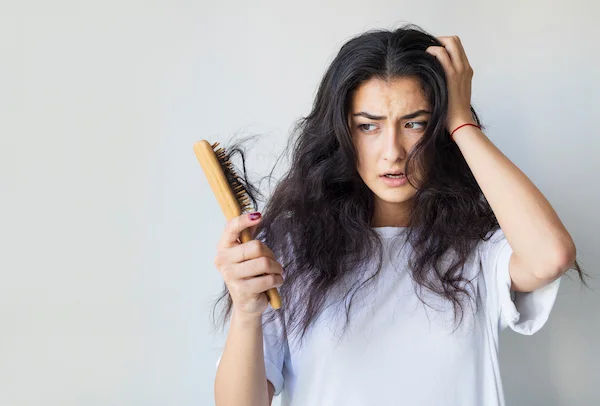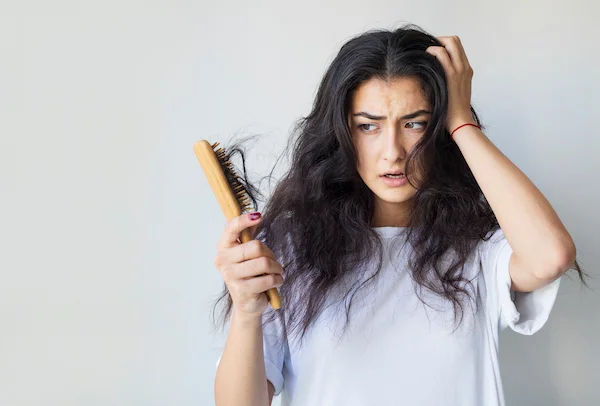Best Monsoon Hair Care Tips to Prevent Frizz and Hair Fall
Fight frizz and hair fall this monsoon with expert-backed monsoon hair care and rainy season hair tips. Simple routines, products, and when to seek care.


Introduction
High humidity, frequent downpours, and damp air can make hair swell, frizz, and tangle. Wet hair is also more fragile, which can lead to increased breakage and shedding in your brush or shower drain. Smart monsoon hair care helps you reduce frizz, protect your scalp, and minimize hair fall. In this guide, you’ll find practical, expert-backed rainy season hair tips you can use right away.
Monsoon hair care 101: What humidity does to hair?
• Humidity and frizz: Hair absorbs moisture from the air. This causes the hair shaft to swell and form more hydrogen bonds, leading to frizz, wave reversion, and loss of definition, especially if your hair is curly or porous.
• Wet hair is weaker: Hair is most vulnerable when wet. Brushing or tying it up tight before it’s fully dry can cause breakage.
• Warm, moist conditions and your scalp: Fungi that cause ringworm (tinea) and yeast involved in dandruff thrive in warm, moist environments. A damp scalp kept under hats or tied-up hair can worsen itching or flaking for some people.
• Sweat, oil, and buildup: More sweat and frequent product use can leave residue on the scalp and hair, weighing strands down and dulling shine.
Rainy season hair tips: Your daily routine
Wash and dry the right way
• Choose a gentle, pH-balanced shampoo: Look for mild, sulfate-free formulas if your scalp is sensitive. If you notice flaking or itching, consider a medicated dandruff shampoo with zinc pyrithione, selenium sulfide, salicylic acid, or ketoconazole. Use as directed on the label.
• How often to wash: Most people do well with washing 2–3 times per week. If you sweat heavily or get drenched, it’s fine to rinse or shampoo sooner. Focus shampoo on the scalp; let the suds cleanse the lengths.
• Rinse with lukewarm water: Hot water can strip oils and increase frizz. A brief cool rinse at the end can help the cuticle lie flatter.
Dry gently
• Blot (don’t rub) with a microfiber towel or soft cotton T-shirt to reduce friction and frizz.
• Air-dry to about 80% before using a dryer on a low-heat, low-speed setting.
• Avoid tying your hair up or sleeping with it wet to reduce breakage and scalp irritation.Consult a Top General Physician
Condition and protect
• Use conditioner every wash: Apply from mid-lengths to ends to smooth the cuticle and reduce friction. This helps with detangling and frizz control.
• Try a leave-in conditioner or serum: Lightweight leave-ins and silicone-based serums can shield hair from humidity and improve shine. Start with a pea-sized amount and adjust as needed.
• Limit heat styling: Heat can damage and dry the hair shaft, making frizz worse in the long run. If you use heat tools, apply a heat protectant and keep settings as low as possible.
• Deep condition as needed: Once a week, use a hydrating mask if your hair feels dry or rough.
Comb and style with care
• Detangle smart: Use a wide-tooth comb on damp hair with conditioner or leave-in to reduce pulling.
• Be gentle: Avoid aggressive brushing, especially when hair is wet. Start at the ends and work up in sections.
• Choose protective, loose styles: Loose braids, buns, or twists reduce tangles and friction without stressing the roots. Avoid tight ponytails or heavy accessories on wet hair.
• Sleep on smooth fabric: A satin or silk pillowcase or a loose satin bonnet reduces friction and frizz overnight.
Scalp care during the monsoon
• Keep the scalp clean and dry: If your scalp stays damp under hats or scarves, give it time to air out. Change out of sweaty headgear promptly.
• Address dandruff early: Flaking and itching can improve with over-the-counter medicated shampoos (zinc pyrithione, selenium sulfide, ketoconazole, salicylic acid). Follow label directions and rinse thoroughly.
• Go easy with oils: If you enjoy oiling, use a light pre-shampoo oil on the lengths to reduce friction. If you’re prone to dandruff or seborrheic dermatitis, leaving heavy oils on the scalp can worsen buildup; keep oil off the scalp or use sparingly.
• Clean your tools: Wash combs, brushes, and hair accessories regularly and let them dry fully. Fungi thrive in warm, moist places.
Rainy day rescue: What to do if you’re caught in the rain?
• Rinse off rainwater: As soon as you can, rinse or shampoo to remove dirt and environmental residue your hair may have picked up outdoors.
• Dry completely: Blot gently, detangle with a wide-tooth comb, and allow hair and scalp to fully dry before tying or covering.
• Refresh your routine: If hair feels sticky or heavy, try a gentle clarifying shampoo once every 1–2 weeks to remove buildup, followed by conditioner.
• Carry essentials: Keep a small microfiber towel, a soft scrunchie, and a travel-size leave-in conditioner or serum in your bag for quick fixes.
Lifestyle habits that support healthy hair in the rainy season
• Nutrition for hair strength: Hair is made of protein. A balanced diet with enough protein (e.g., eggs, fish, dairy, legumes), plus iron, zinc, and vitamin D, supports normal hair growth. Deficiencies in these nutrients can contribute to shedding.
• Hydrate: Adequate fluids support your scalp and overall health.
• Manage stress and sleep: Significant stress can push more hairs into a shedding phase (telogen effluvium). Prioritize sleep, movement, and relaxation techniques.
• Exercise and scalp hygiene: Regular activity is great for health; just remember to cleanse sweat from your scalp afterward.
• Avoid smoking: Smoking is linked to poorer hair and skin health and may worsen hair loss over time.
Products to consider for monsoon hair care
• Mild daily shampoo: For routine cleansing without stripping.
• Medicated dandruff shampoo: For flakes/itch; look for zinc pyrithione, selenium sulfide, ketoconazole, or salicylic acid.
• Rinse-out conditioner: To smooth and detangle.
• Leave-in conditioner/anti-frizz serum: To seal the cuticle and combat humidity.
• Heat protectant: If using heat tools.
• Microfiber towel: To reduce frizz during drying.
• Wide-tooth comb: For gentle detangling.
• Sun/rain protection: A breathable hat or umbrella helps limit repeated soaking.
When to see a dermatologist?
Consider professional advice if you notice:
• Suddenly, heavy shedding for more than a few weeks
• Round or patchy hair loss, scaling, or broken-off hairs (possible fungal infection)
• Persistent dandruff, redness, or itching not improving after 2–4 weeks of OTC treatment
• Pain, swelling, pus, or sores on the scalp
• Thinning at the crown or widening part, or a family history of hair loss, and you want to discuss options
• Hair loss after illness, childbirth, or a new medication, especially if it’s worrying or prolonged
Quick rainy season hair tips checklist
• Blot with a microfiber towel; avoid rough rubbing
• Use a gentle shampoo; condition every wash
• Try an anti-frizz leave-in or serum
• Detangle with a wide-tooth comb; avoid tight styles especially on wet hair
• Rinse off rainwater and dry your scalp promptly
• Use medicated dandruff shampoo if you have flakes or itch
• Clean and dry combs, brushes, and accessories regularly
• Nourish your body with protein, iron, zinc, and vitamin D; manage stress and sleep wellConsult a Top General Physician
Consult a Top General Physician

Dr. Rajib Ghose
General Physician/ Internal Medicine Specialist
25 Years • MBBS
East Midnapore
VIVEKANANDA SEBA SADAN, East Midnapore

Dr. Swaroopa Rani
General Physician/ Internal Medicine Specialist
9 Years • MBBS, MD (Internal Medicine)
Bengaluru
Apollo Medical Center, Marathahalli, Bengaluru

Dr. Utsa Basu
Diabetologist
14 Years • MBBS , MD
Barasat
Diab-Eat-Ease, Barasat
(75+ Patients)

Dr. Anindita Mondal
General Physician/ Internal Medicine Specialist
8 Years • MBBS
Kolkata
VDC Clinic, Kolkata

Dr. Santanu Mandal
General Physician/ Internal Medicine Specialist
18 Years • MD (Physician), DNB (General Medicine)
Kolkata
MCR SUPER SPECIALITY POLY CLINIC & PATHOLOGY, Kolkata
(25+ Patients)
Consult a Top General Physician

Dr. Rajib Ghose
General Physician/ Internal Medicine Specialist
25 Years • MBBS
East Midnapore
VIVEKANANDA SEBA SADAN, East Midnapore

Dr. Swaroopa Rani
General Physician/ Internal Medicine Specialist
9 Years • MBBS, MD (Internal Medicine)
Bengaluru
Apollo Medical Center, Marathahalli, Bengaluru

Dr. Utsa Basu
Diabetologist
14 Years • MBBS , MD
Barasat
Diab-Eat-Ease, Barasat
(75+ Patients)

Dr. Anindita Mondal
General Physician/ Internal Medicine Specialist
8 Years • MBBS
Kolkata
VDC Clinic, Kolkata

Dr. Santanu Mandal
General Physician/ Internal Medicine Specialist
18 Years • MD (Physician), DNB (General Medicine)
Kolkata
MCR SUPER SPECIALITY POLY CLINIC & PATHOLOGY, Kolkata
(25+ Patients)
More articles from Hair Problems
Frequently Asked Questions
Q1: Does humidity cause hair fall?
Humidity makes hair absorb water from the air, which swells the shaft and increases frizz. Wet, swollen hair is more fragile and can break more easily, which you might notice as more hair in your brush. That’s breakage, not necessarily true shedding from the root. Gentle handling, conditioner, and anti-frizz products help.
Q2: How often should I wash my hair during the monsoon?
Many people do well with 2–3 washes per week, but adjust based on your scalp’s oiliness, sweat, and lifestyle. If you get drenched in the rain or after a workout, rinse or shampoo sooner and always let your hair and scalp dry fully.
Q3: Is it okay to oil my hair in the rainy season?
Light pre-shampoo oiling on the lengths can reduce friction and help detangle. If you have dandruff or an oily, itchy scalp, avoid leaving heavy oils on the scalp as they can contribute to buildup. Wash oils out thoroughly.
Q4: Are anti-dandruff shampoos safe to use regularly?
Yes, when used as directed. Shampoos with zinc pyrithione, selenium sulfide, ketoconazole, or salicylic acid can help with flakes and itch. Typically, you’ll use them a few times per week and leave them on the scalp for the recommended time before rinsing. If irritation occurs or symptoms persist, see a dermatologist.
Q5: Can rainwater damage hair?
Getting rained on isn’t usually harmful by itself, but hair that stays wet longer is more prone to frizz and breakage. Outdoor rain exposure can also leave dirt and environmental residue on hair. Rinse and dry your hair and scalp as soon as you can after a downpour.




